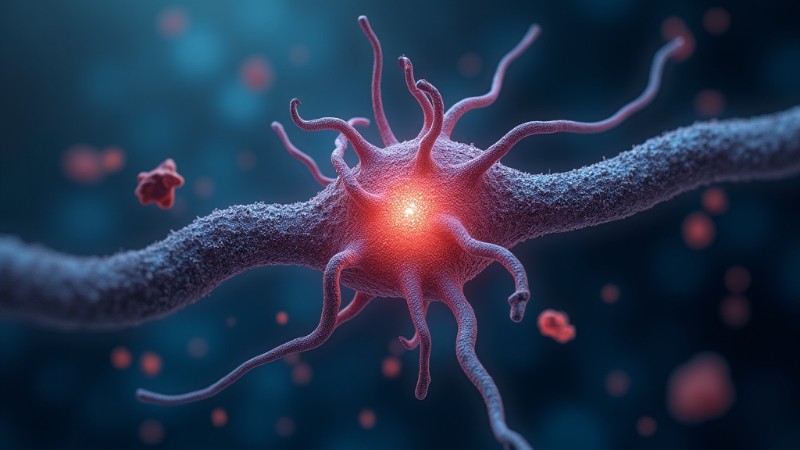A new study led by researchers at Case Western Reserve University is shedding light on the complex relationship between brain proteins and the onset of Alzheimer’s disease. This ambitious research aims to understand how specific proteins, particularly Eph receptors, interact with the blood-brain barrier and contribute to the development of this devastating neurological disorder.
Alzheimer’s disease affects nearly 7 million Americans aged 65 and older, gradually impairing memory and cognitive abilities, and remains one of the most challenging diseases to treat.
Key Takeaways
A new study at Case Western Reserve University is investigating the link between brain proteins and Alzheimer’s disease, aiming to understand how specific proteins interact with the blood-brain barrier.
- Alzheimer’s disease is often associated with a breakdown of the blood-brain barrier, allowing toxins to invade the brain and accelerate the progression of the disease.
- Researchers are focusing on Eph receptors, a type of protein that plays a crucial role in cell signalling, which may play a key role in the development of Alzheimer’s.
- The study aims to uncover new insights into Alzheimer’s disease and potentially lead to innovative therapeutic approaches that could halt or slow the progression of the disease.
Weakening of the blood-brain barrier
Alzheimer’s disease is often associated with a breakdown of the blood-brain barrier, the protective shield that surrounds thebrain and prevents harmful substances from entering. According to previous studies, this weakening of the barrier may allow toxins to invade the brain, disrupting normal function and accelerating the progression of Alzheimer’s disease.
The University’s researchers are particularly focused on understanding how this process occurs and how it relates to brain proteins like Eph receptors.
Eph receptors, which are a type of protein that plays a crucial role in cell signalling, have been linked to various functions in brain development. The current study extends that research by exploring the role these receptors may play in the development of Alzheimer’s.
Professor Bing-Cheng Wang of Case Western had previously conducted research on Eph receptors in the context of both brain development and cancer, and his work is now proving invaluable for this new investigation into Alzheimer’s.
Collaborative research and techniques
This study is part of a larger research initiative funded by the National Institutes of Health (NIH) to uncover new insights into Alzheimer’s disease. Collaborators from various fields, including neuroscientists and protein researchers, are working together to decode the intricate structure of brain proteins that may influence the disease.
Scientists from Memorial Sloan Kettering Cancer Center are utilizing cutting-edge crystallography techniques to examine these proteins in detail, providing the Case Western team with a clearer understanding of how these proteins function and interact within the brain.
The researchers hope that by understanding the structure of these proteins and their impact on the blood-brain barrier, they can uncover key mechanisms that drive the onset of Alzheimer’s.
According to Buck, one of the researchers involved, Alzheimer’s is a multifaceted and deeply entrenched disease, requiring a broad, collaborative approach to untangle its complexities. The NIH-supported project aims to provide insights into these underlying mechanisms and open up new avenues for therapeutic interventions.
Potential for therapeutic breakthroughs
The long-term goal of the Case Western team is to develop innovative treatments that target the complex interplay between brain proteins and the blood-brain barrier in Alzheimer’s patients.
By focusing on the interactions of Eph receptors and the protective brain barrier, scientists hope to design therapies that could slow or prevent the onset of Alzheimer’s altogether. The findings could lead to more effective treatments that address the root causes of the disease, rather than just alleviating symptoms.
Current treatments for Alzheimer’s primarily focus on slowing the progression of symptoms but have limited impact on halting or reversing the disease.
A deeper understanding of how the blood-brain barrier is compromised could lead to a breakthrough in treating Alzheimer’s at an earlier stage, potentially preventing the deterioration of memory and cognitive abilities in millions of elderly patients.
Takeaways
This research represents a significant leap forward in Alzheimer’s research, as it combines protein crystallography, blood-brain barrier studies, and neurological research into a single, focused effort.
As the study progresses, researchers remain hopeful that their findings will pave the way for new, life-changing therapies that could fundamentally alter how Alzheimer’s disease is treated and managed.
The study being conducted at Case Western Reserve University underscores the importance of interdisciplinary collaboration in addressing the complexities of Alzheimer’s disease.
With a better understanding of how brain proteins like Eph receptors interact with the blood-brain barrier, scientists may be on the brink of discovering innovative therapeutic approaches that could halt or slow the progression of this debilitating condition.



